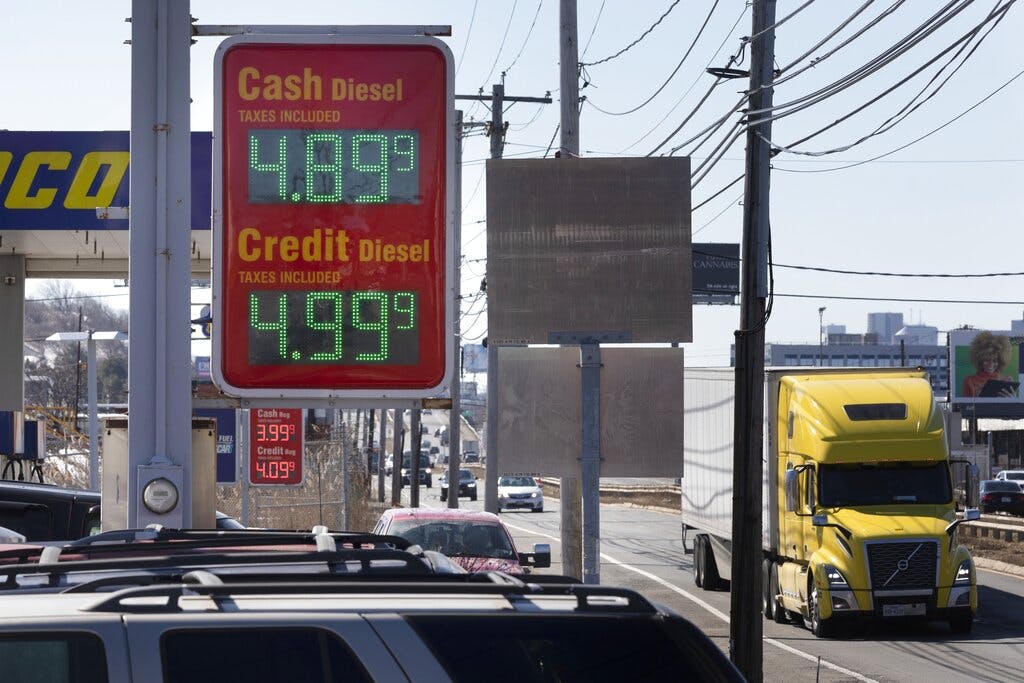Biden, Maneuvering on Two Fronts Against an Energy Squeeze, Is Courting Disaster, Critics Warn
Biden is asking for help from none other than Venezuela’s dictator, Nicolas Maduro, a Marxist foe of America, and from Saudi Arabia.

President Biden, in an attempt to buck skyrocketing energy costs at home and abroad, is maneuvering on two fronts in a geopolitical straddle that critics warn is bound to backfire.
On the one hand, Mr. Biden is asking for help from none other than Venezuela’s dictator, Nicolas Maduro, a Marxist foe of America. On the other hand, Washington is appealing to Saudi Arabia, an ally that is worried about Iran, whom Mr. Biden is also trying to appease.
That Mr. Biden’s advisers are discussing a possible visit to the Saudi kingdom this spring was reported today by Axios. The idea, it reckons, would be to repair relations and “convince the kingdom to pump more oil.” Mr. Biden’s warm up to Caracas, though, is not so much a practical maneuver as a dangerous ideological démarche.
All this is taking place as pressure — including from Speaker Pelosi — rises on the White House to ban Russian energy imports. Crude oil prices have reached a high of $130 a barrel today, while Americans are now paying an average of $4 a gallon to fill their cars. To offset those price pressures, Washington over the weekend sent a delegation of top officials to Caracas.
The White House communications director, Jen Psaki, declined today to specify the topics of “ongoing” discussions with Caracas, beyond saying they include “energy security” and negotiations over American hostages held in Venezuela on trumped up charges.
Venezuela watchers say any American investment in Venezuela’s rusted oil industry would serve to enrich Mr. Maduro and his cronies but yield little in the way of shoring up “energy security.” Venezuela’s oil industry is “in shambles,” Senator Rubio tweeted.
“Because of marxist incompetence & corruption,” the Floridian tweeted, “it will takes years before they can produce enough to even come close to replacing #PutinOil. Biden is just using this as an excuse to cut the deal with the #Maduro [regime] he has wanted all along.”
Any attempt to reset America’s relations with Caracas will fail, adds an independent Venezuelan-born journalist now living in New York, Maibort Petit. “Maduro will not fall in love with Biden,” she says, adding that Caracas has signed 264 agreements with Moscow in recent years, covering arms supplies, military training, education, and more.
Mr. Maduro also is tied to Tehran, Beijing, and Havana.
“China, Russia, Cuba, and Iran — they own Venezuela”: That is how Ms. Petit puts it. For months now Mr. Maduro has attempted to lure the Biden administration into dropping sanctions that were, in 2017, laid on him by President Trump. Mr. Maduro hopes that American companies would be allowed to reinvest in Venezuela’s crumbling oil industry.
After those sanctions were imposed, Venezuela’s oil production dropped to 300,000 barrels in 2017 from 3 million barrels of crude a day in the 1990s. With the aid of Russia and Iran, Venezuela managed to raise production, which last year reached 760,000 barrels daily.
In 2020, the Department of Justice indicted Mr. Maduro and other Venezuelan officials on charges of narco-terrorism, corruption, drug trafficking, and other alleged crimes. Caracas is likely to demand all charges be dropped in return for any agreement with Washington.
Ratcheting up pressure on Caracas, Mr. Trump also recognized Juan Guaido in 2019 as the legitimate leader of Venezuela, even though Mr. Maduro holds the levers of power. As part of that move, Washington transferred ownership of Citgo, which sells oil in America, to Mr. Guaido from the Maduro-controlled national oil company, Petroleos de Venezuela S.A.
Mr. Maduro wants PdVSA to regain control. Meanwhile, an American-aided revival of Venezuela’s oil industry could help Mr. Maduro pay off his country’s debt to Moscow, one that some estimate could be as much as $15 billion.
In addition to Russia, Venezuela has for years maintained strong ties with Iran and its Mideast proxies. Caracas’s petroleum minister, Tareck al Assaimi, is of Lebanese descent and has deep ties with Hezbollah. Direct flights between the two countries are due to renew later this month.
Iran is instrumental in helping Venezuela refine its crude oil. Replacing it with American refinement, even if possible, would take years. The Iranian connection, meantime, makes Venezuela a portal for terrorism-related activities on America’s doorstep.
Just last year, the FBI disclosed it had interrupted an Iranian plot to kidnap an American citizen, Masih Alinejad, a prominent, Brooklyn-based critic of the Iranian regime. The scheme was to hustle her on a speedboat to Venezuela, where she would summarily be shipped off to a certain death in Iran.
A thawing of American ties with Tehran and Caracas “would allow Iran, Russia, and Venezuela to triangulate sanctions,” says the Foundation for the Defense of Democracies’s Emanuele Ottolenghi, who focuses on Mideast terrorists in Latin America.
Venezuela would pay its debt to Russia, which in turn would increase trade with Iran, while Tehran deepened ties with Venezuela — a country Mr. Ottolenghi calls the “gateway” to Iranian and Hezbollah terrorists’ presence in Latin America.
On the campaign trail Mr. Biden vowed to promote democracy around the world. Mr. Maduro has turned a once-flourishing country into a mafia-state. While Saudi Arabia is far from a democracy, it is at least an American ally and is much more consequential in the oil markets than either Venezuela or Iran.
In Venezuela, it’s narco-lords, terror-masters, and money laundering oligarchs who control the economy; poverty is at an all-time high; inflation has made life unbearable; and street crime is rife. Mr. Maduro’s Venezuela is decisively anti-American and allied with our worst enemies. Mr. Biden is knocking on his door anyway.

